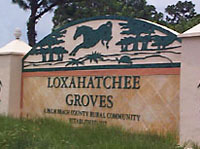The Loxahatchee Groves Town Council hesitated Tuesday on the preliminary reading of yet another ordinance designed to control animal waste haulers and collectors, deciding that the ordinance as written would infringe on the rights of residents.
Objectionable items in the latest draft ordinance included permits and fees for residents to move small amounts of animal waste onto or off of their property, when the intent is to control haulers with dump-truck loads of the stuff, and property owners who allow those haulers to pile it several feet high on their property.
The existing ordinance has been largely unenforceable under the pressure of tons of horse waste and bedding coming into the town daily, and haulers who find weaknesses in the ordinance and its enforcement.
Council members and some residents who spoke agreed that the goal of the ordinance is to not only control a nuisance, but also to improve water quality, which will become an issue when federal numeric water quality standards go into effect.
Town Manager Mark Kutney supplied support material for the ordinance, including county policies and best management practices for placement of manure and other fertilizer to minimize water contamination, but council members said too many of the best management practices had been incorporated into the regulations.
Town Attorney Michael Cirullo reviewed two ordinances, one for haulers and one for receivers, with definitions similar to a long-standing Wellington ordinance, so the two municipalities would have consistency in terminology, since much of the horse waste dumped in Loxahatchee Groves comes from Wellington. This way, the two communities could better coordinate law enforcement.
Also provided was a definition of “nuisance” on the recommendation of the Palm Beach County State Attorney’s Office, in the event the town seeks an option to enforce portions of the ordinance as a criminal infraction.
The draft ordinance also varies the permit fee for commercial and local haulers: It’s $500 for commercial haulers and $100 for local or self-haulers. The fine for a hauler caught dumping without a permit would be $2,000, which is the same as under the current ordinance.
Cirullo said the fees were included because there will be costs involved with enforcement and recordkeeping by the town.
The draft ordinance keeps the number of loads allowed per hauler at 20 per year, with an additional 30 loads allowable for $40 per load.
Councilman Tom Goltzené was concerned that the new ordinance would start affecting residents.
“The first thing I see is we’re going to start charging people $100 for residents just self-hauling manure from their own property to take it somewhere. Now they have to pay $100 or they can get busted. I don’t think that’s right, especially if getting busted charges you $2,000 just because you loaded up your truck and took it down the road,” he said. “That’s not what we’re after, and I think we need to stay focused on the commercial people. If you’re a town resident moving it within the town, it should be free. People need to be able to do what they have done before.”
Mayor Dave Browning said he did not see a need to regulate people hauling animal waste out of the town.
“Our intent is to keep manure from coming in to Loxahatchee Groves,” he said. “I want to be careful that I don’t make it hard for somebody who has a horse farm that doesn’t really have someplace to take it in Loxahatchee Groves and just wants to get rid of it. If somebody wants to haul it out of Loxahatchee Groves, I’m tickled to death.”
Goltzené reiterated that the goal is to stop people who are getting paid to dump manure in the town.
“We don’t want to start doing something that isn’t what the problem is,” he said. “The problem is manure from outside being brought in and dumped in vast quantities. That’s what we should try to regulate, not everything that relates to horses.”
Goltzené said that he has been enthused at the cooperation the town has received from the Palm Beach County Sheriff’s Office and Public Works Director Frank Schiola, who have been able to enforce the existing ordinance to some extent.
“It’s a very simple thing, they’re saying, ‘You brought it from Wellington,’ so they understand it. ‘We won’t bring it from Wellington,’” Goltzené said. “Why do we have to go through the rest of this? It’s really creeping government regulation and really unfunded mandates on the management company, because I don’t know how the heck they’re going to do this.”
Schiola said the enforcement of the ordinance is difficult, considering the that town only has one part-time code enforcement officer and Wellington has a full-time staff.
“We’re getting in here 400 to 500 cubic yards a day,” Schiola said. “That’s a lot, and the commercial hauler will look at your ordinance and exploit your weaknesses. You don’t have 15 people out there every day, you have a couple of people out there part-time. You have the Environmental Crimes Unit. If it wasn’t for them, you would have a bigger problem because we don’t have enforcement.”
Loxahatchee Groves Water Control District Supervisor John Ryan said he liked the rural vision of Loxahatchee Groves and not wanting to put a burden on residents with permits and fees and record-keeping, but said the town had something larger at stake with the advent of federal water quality standards.
“This is not a normal circumstance,” Ryan said. “We’ve got 18 months to two years before we’re going to have canal water nutrient regulation. It’s coming from Washington through the state to us. We face a disaster, and that disaster is the expense of monitoring and the expense of some sort of stormwater treatment area or some sort of holding area. We can’t afford that.”
Council members agreed to hold off on the preliminary reading of the ordinances until it can be rewritten by staff with recommended changes from council members.








